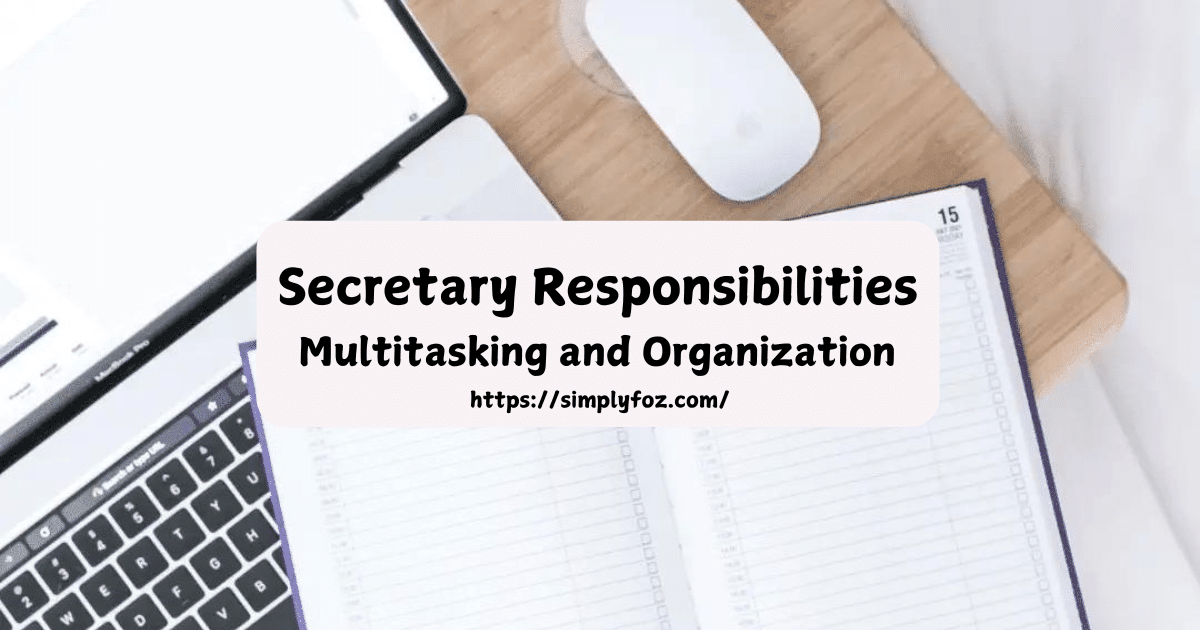

11
Aug

الصفحة الرئيسية » Life and Work » Secretary Responsibilities: Multitasking and Organization
In this post, I’m going to talk about the secretary responsibilities: multitasking and organization, as I’ve been in this field for more than ten years. As a secretary, you play a significant role in the smooth functioning of any organization. Your responsibilities go beyond just answering phone calls and scheduling appointments. You are the backbone of the office, ensuring that everything runs seamlessly. Today, I will explore the various aspects of a secretary’s responsibilities and how you can excel in this crucial role.
I’m welcoming you to the world of secretarial duties! Whether you are new to this profession or have been in the field for some time, it’s important to understand the breadth and depth of your responsibilities. I will dive deep into the essential tasks of a secretary and provide a comprehensive guide to help you master this art. So buckle up your seatbelts and let’s go!
As a secretary, one of your primary responsibilities is to handle administrative tasks efficiently. This may include managing correspondence, organizing meetings, and maintaining official records. Let’s break down these duties and explore them further.

In today’s digital age, communication plays a vital role in organizations. You will often find yourself responsible for handling emails, letters, and phone calls. Prioritizing and responding to these correspondences promptly is essential. Keep in mind that your written and verbal communication skills are crucial to maintaining the professional image of your organization.

Organizing meetings and appointments is another vital aspect of your role. You may be required to arrange schedules, send out invitations, book meeting and conference rooms, and coordinate with participants. Being meticulous and detail-oriented is key to ensuring that all parties involved are well-prepared and informed. Embracing digital tools such as calendar apps and scheduling software can simplify this process.

As a secretary, you are responsible for maintaining official records such as files, documents, and databases. Creating an organized filing system is essential for easy retrieval of information when needed. Familiarize yourself with different document management systems and ensure that you have backups in place to prevent any data loss.

Apart from managing administrative tasks, secretaries often serve as a crucial support system for executives and management. Let’s explore this aspect of your responsibilities in more detail.

Being responsible for managing your executive’s calendar is a task that requires excellent organizational skills. You will need to prioritize appointments, block out time for important tasks, and ensure that there is no overbooking. Be prepared to handle last-minute changes and adapt to your executive’s preferences and priorities.

In many organizations, secretaries are also responsible for making travel arrangements for executives. This involves making reservations for flights, hotels, and ground transportation. Familiarizing yourself with online booking platforms and travel management tools can make this process more efficient.

As a secretary, you often act as the gatekeeper of information. You may be responsible for filtering and forwarding relevant information to the appropriate individuals. Maintaining confidentiality and discretion is of utmost importance in this role.
In some organizations, secretaries are involved in human resources-related tasks. Let’s explore how you can contribute to the HR functions within your organization.

You may be tasked with assisting in the recruitment process by posting job ads, scheduling interviews, and coordinating with candidates. Having a basic understanding of the recruitment process and being well-versed in job portals can be beneficial in this role.

New employees often look to the secretary for guidance during their initial days. Assisting with onboarding and orientation can include providing necessary paperwork, introducing them to the office culture, and answering their queries. Remember, your friendly and approachable demeanor can help new hires feel welcomed.
Maintaining employee records is another critical responsibility that may fall under your purview. This includes keeping track of attendance, leaves, and employee documentation. Staying organized and up-to-date with any changes in personnel details is essential for smooth HR operations.
I’ve covered a wide range of duties, from managing administrative tasks to supporting executives and contributing to HR functions. Remember, mastering the art of multitasking and organization is key to excelling in this role.
As you embark on your journey as a secretary, continue to enhance your communication skills, stay updated with the latest digital tools, and be proactive in your approach. Embrace opportunities for professional growth, such as attending workshops or pursuing certifications in administrative management.